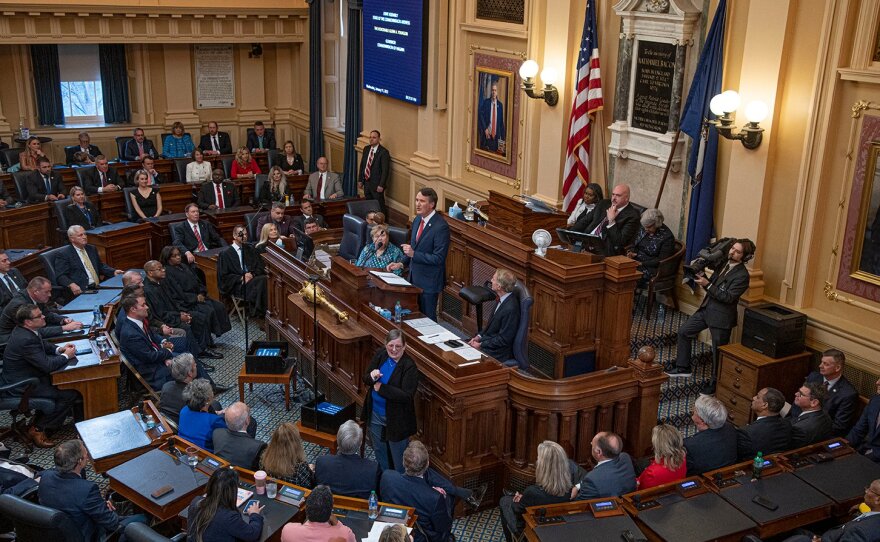Virginia lawmakers largely rejected legislation in this year’s session designed to impose new limitations on how they raise money — and what they do with it.
Lawmakers killed bills that would have banned them from using campaign funds for personal expenses, one that barred fundraising during special sessions and others that would cap the amount donors can give per year; there is currently no limit on donations.
Their posture is not new: A committee set aside last year to study the issue never met or issued a final report.
For now, at least, Virginia’s freewheeling campaign finance system will largely be unchanged — much to the chagrin of Nancy Morgan, chair of BigMoneyOutVA.
“This is like watching Groundhog's Day,” Morgan said, referring to the film where a cynical weatherman played by Bill Murray repeats the same day over and over again. “Anyway, we're here for the long haul.”
A Republican-controlled House of Delegates subcommittee torpedoed some of the bills, including measures from both Democrats and Republicans aimed at banning lawmakers from spending campaign cash on personal expenditures. In recent years, lawmakers have used campaign cash to pay for expensive meals, reimburse their children for cleaning their office and film a video of them jet-skiing.
Del. Wren Williams (R–Patrick) argued in a subcommittee that the measure was unnecessary and noted that Democrats failed to pass the bill when they held control of the General Assembly.
“I would suggest that donors need to not donate to people they don’t trust,” Williams said at the Feb. 1 meeting.
The Democrat-controlled Senate declined to pass another bill banning fundraising during special sessions sponsored by state Sen. David Suetterlein (R–Roanoke County). Lawmakers have fundraised extensively during past special sessions but are barred from doing so during regular sessions.
Senators sent the bill back to committee in an unrecorded Feb. 1 voice vote, effectively killing it. Critics said they agreed with the bills’ goals but said it was too broad; Suetterlein was unswayed.
“I think that it is an attempt to not have to vote on this bill so that we can continue fundraising during special sessions,” Suetterlein said.
Another of Suetterlein’s bills did manage to make it out of both chambers. It would increase the number of financial reports that state political action committees are required to submit ahead of an election. He said in a January committee meeting that the bill was designed to give more transparency into PACs that form late in a race and spend lots of money.
Currently, the public may not know the backers of the group until after an election.
“I think it’s important we know who’s funding these things,” Suetterlein said.
He alluded to the case of a secretive PAC backed by $250,000 from Dominion Energy that ran ads portraying now-Gov. Glenn Youngkin as soft on gun rights during his campaign. Suetterlein’s bill wouldn’t have affected the now-dormant Virginia Accountability PAC, however, since it was a so-called super PAC registered at the federal rather than state level; news of the PAC’s financing emerged several weeks before the election.
The free flow of cash to state politicians shows no signs of slowing. The 2021 Virginia governor’s race set a $138 million fundraising record — nearly double the total just four years before, according to the Virginia Public Access Project.
The fundraising bonanza also extends to state lawmakers and transcends party lines. Dominion Energy has been the top corporate donor since Jan. 1, 2022 (excluding donations under $1,000 from this year, which have yet to be reported) and all-time since VPAP began tracking contributions in 1996. But Charlottesville investor Michael Bills’ group, Clean Virginia — which aims to counter Dominion’s influence — has in recent years equaled or surpassed the company’s spending. (Bills’ wife, philanthropist Sonjia Smith, is also a major donor.)
Amazon has also become an increasingly large player in Virginia as it builds a second headquarters and plans a $35 billion data center expansion in the commonwealth, both fueled by state subsidies. The company contributed more than $387,000 last year to a bipartisan roster of candidates, nearly 10 times the amount it gave five years before.



